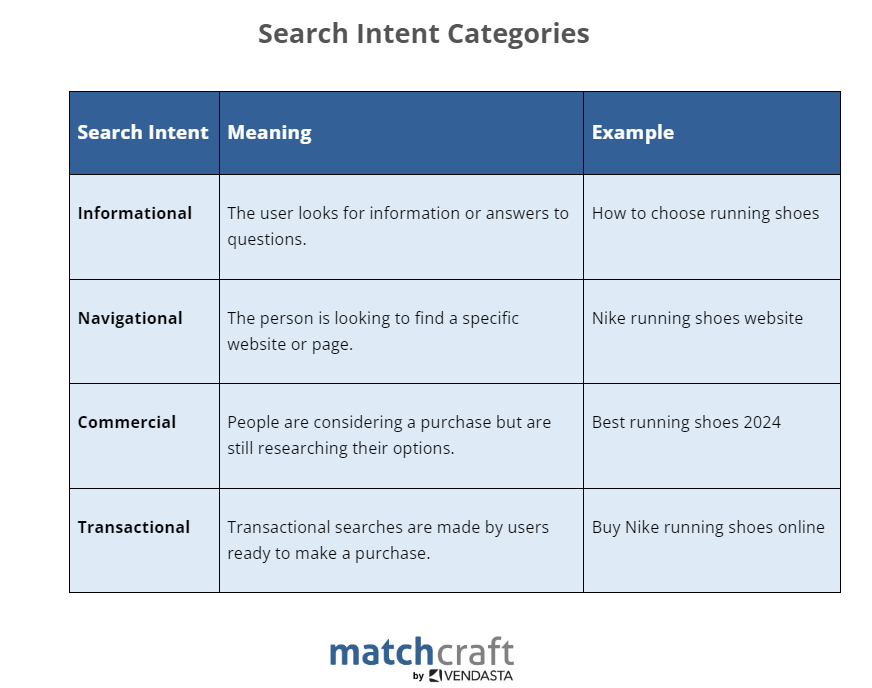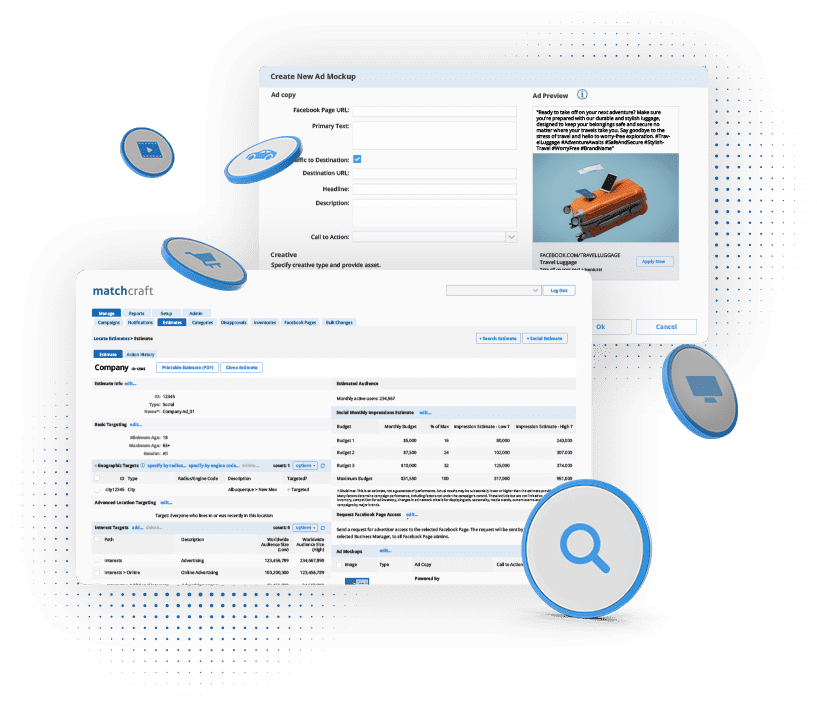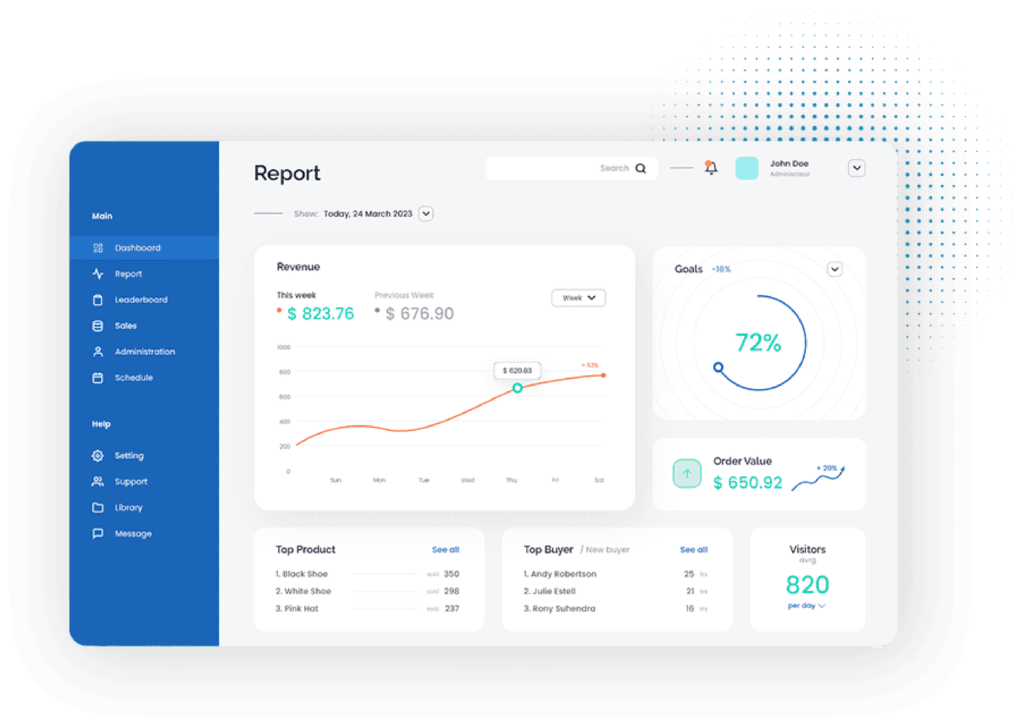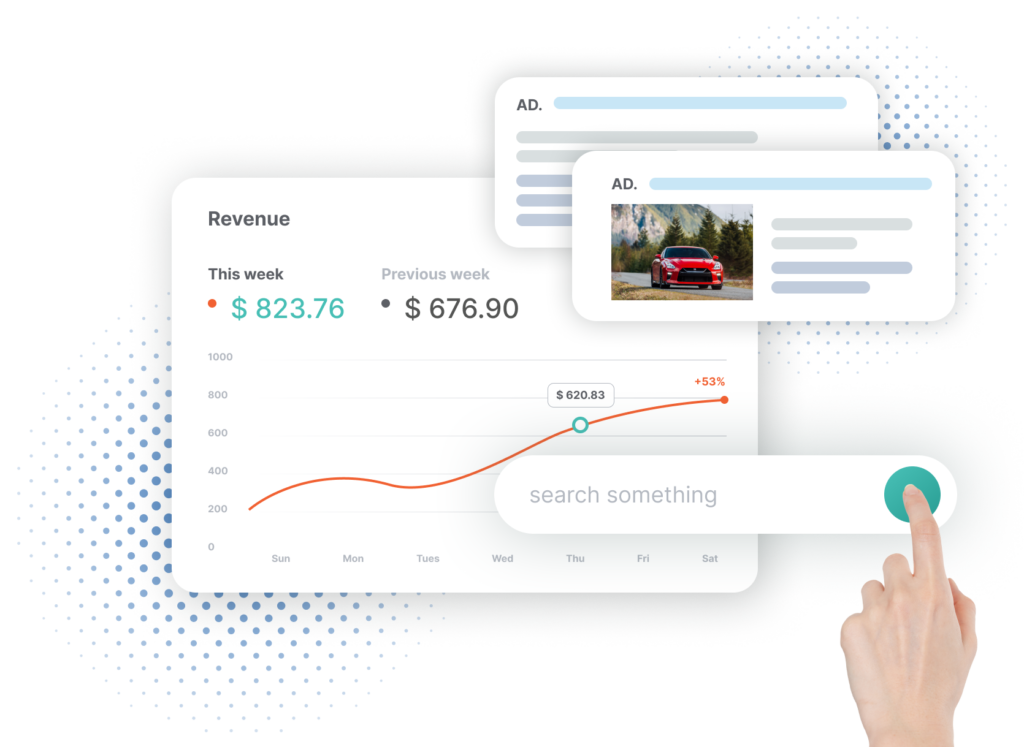The success of your pay-per-click (PPC) campaign hinges on attracting the right audience to click your ads. To achieve this, you need to use relevant keywords that your potential customers are likely to use when searching for your products or services.
PPC keyword research is the cornerstone of a successful PPC campaign. Think of it as the foundation on which you build your advertising house. With proper keyword research, you can optimize your ad spend, enhance conversions, and boost ROI.
In this comprehensive guide, we’ll walk you through what PPC keyword research is, why it’s important, tools you can use, future trends, and more.
Understanding PPC Keywords
Diving into the world of PPC advertising means getting to know the different types of keywords, match types, and search intent categories. Each plays a critical role in how well your ads perform and how efficiently you reach your target audience.
Let’s break down these elements to help you get the most out of your PPC campaigns.
Types of Keywords
Short-Tail Keywords: Short-tail keywords, also known as “head” keywords, are broad and often consist of one or two words.
Example: “shoes” or “running shoes.”
These keywords have high search volumes, meaning lots of people are searching for them. However, they are also highly competitive and can be costly.
Long-Tail Keywords: Long-tail keywords are more specific and usually contain three or more words.
Example: “best running shoes for flat feet.”
They have lower search volumes but are less competitive and often more cost-effective. They attract highly targeted traffic, which means the people clicking on your ads are more likely to be interested in your specific offering.
Branded Keywords: Branded keywords include your company’s name or product names.
Example: “Nike running shoes.”
These keywords help ensure that people searching for your brand find your ads. They typically have high conversion rates since searchers are already familiar with your brand and likely closer to making a purchase.
Non-Branded Keywords: Non-branded keywords do not include any brand names. They are more general terms that relate to your products or services.
Example: “comfortable running shoes.”
These keywords help attract new customers who might not be familiar with your brand but are looking for what you offer.
Keyword Match Types
Understanding match types is essential for controlling which searches trigger your ads.
- Broad Match: This is the default match type that shows your ads for searches related to your keywords, even if the exact words aren’t included.
- Phrase Match: This ensures your ads show only when the search query includes your exact keyword phrase, in the same order, but may have additional words before or after.
- Exact Match: This match type triggers your ads only when the search query matches your keyword exactly or is a close variation. It provides the most control and shows your ads to a highly targeted audience, which can result in higher conversion rates.
- Negative Match: This type of match prevents your ads from showing specific terms that aren’t relevant to your campaign.
Search Intent Categories
When people search online, they do so with a purpose. Understanding their intent is crucial for targeting them with the appropriate message.
Here’s a list of search intent you must know:

Importance of Keyword Relevance and Quality Score
Having relevant keywords is crucial to your PPC ads, as they help you target relevant audiences. Moreover, Google rewards relevant ads with a higher Quality Score.
Google calculates Quality Score based on the quality and relevance of your keywords and PPC ads. This score influences your ad rank and the cost-per-click (CPC). A higher score can lead to lower CPCs and better ad placements, meaning you get more value from your ad spend.
To improve your Quality Score, ensure your keywords are closely related to your ad copy and landing page content. Provide a seamless and user-friendly experience when users visit your landing page.
Step-by-Step PPC Keyword Research Process
Conducting PPC keyword analysis might seem daunting at first, but breaking it down into manageable steps can make the process smoother and more effective.
Follow this step-by-step guide to ensure your campaigns are targeting the right audience with the right PPC keywords:
1. Define Your Goals and Target Audience
Before diving into keyword research, ask yourself, “What do I want to achieve with my PPC campaigns?” Are you aiming to increase brand awareness, drive more traffic to your website, generate leads, or boost sales? Clear goals will guide your keyword selection and strategy.
Next, identify your target audience. Consider demographics, interests, online behavior, and pain points. Creating detailed buyer personas can help you understand who you’re targeting and tailor your keywords accordingly.
For example, if your client runs an online pet store, your goal might be to increase sales of premium dog food. Your target audience could be pet owners who prioritize high-quality nutrition for their dogs.
2. Brainstorm Seed Keywords
Seed keywords are the starting point for your keyword research. These are basic terms related to your products, services, or industry. Think about the words and phrases your potential customers might use when searching for what you offer.
Tips for Brainstorming Seed Keywords:
- Consider your products and services. What words describe them?
- Think about common questions or problems your audience has.
- Use tools like Google Autocomplete to see suggested searches.
3. Use Keyword Research Tools
Now that you have a list of seed keywords, it’s time to expand your list using keyword research tools. These tools provide data on search volume, competition, and additional keyword ideas.
Popular Keyword Research Tools:
- Google Keyword Planner: A free tool that provides search volume data and keyword suggestions.
- SEMrush: A comprehensive tool for keyword research and competitor analysis.
- Ahrefs: Known for its extensive keyword database and competitive analysis features.
Pro Tip: If your PPC agency is focusing on e-commerce clients, leverage our proprietary keyword and ad copy library to target the relevant keywords and audience. 
4. Analyze Search Volume and Competition
Not all keywords are created equal. Some might have high search volumes but also high competition, making them more expensive and harder to rank for. Others might have lower search volumes but less competition, offering a better opportunity for targeted traffic.
So how do you analyze keywords?
- Search Volume: Indicates how often a keyword is searched for in a given period. Higher search volumes mean more potential traffic.
- Competition: Shows how many advertisers are bidding on the keyword. But remember, high competition can increase your cost-per-click (CPC).
5. Consider Commercial Intent and Relevance
Did you know Google Ads receives nearly 65% clicks on commercial keywords?
Commercial intent keywords indicate that the searcher is likely looking to make a purchase. They are more valuable for driving conversions. Relevance is also crucial; your keywords should closely match the products or services you offer.
6. Group Keywords into Themes or Ad Groups
Organizing your keywords into themes or ad groups helps you create more targeted and relevant ads. Each ad group should focus on a specific set of related keywords, making it easier to write ad copy that speaks directly to the searcher’s intent.
You can group the keywords by:
- Product or service category
- Search intent
- Audience segment
7. Identify Negative Keywords
Negative keywords prevent your ads from showing for irrelevant searches, saving your budget for more relevant clicks. Think about terms that might attract the wrong audience or searches that don’t align with your goals.
Tips for Finding Negative Keywords:
- Look at your search terms report to see what irrelevant terms are triggering your ads.
- Consider variations of your keywords that don’t match your products.
For example, if your client doesn’t sell cheap dog food, you might add “cheap” and “budget” as negative keywords to avoid attracting bargain hunters.
8. Prioritize Keywords Based on Potential ROI
Not all keywords are worth the same investment. Prioritize keywords that have the highest potential ROI by considering factors like search volume, competition, commercial intent, and relevance to your goals.
How to Prioritize:
- Focus on high-intent keywords that are more likely to convert.
- Balance high-competition keywords with less competitive, long-tail keywords.
- Regularly review and adjust your keyword priorities based on performance data.
Advanced PPC Keyword Research Techniques
Want to excel in PPC advertising? You need to take keyword research up a notch to achieve better conversions and ROI. Advanced techniques can help you uncover hidden opportunities, outsmart your competitors, and stay ahead of industry trends.
Here’s a guide to mastering advanced PPC keyword research techniques:
Competitor Keyword Analysis
One of the most insightful ways to enhance your keyword strategy is by analyzing your competitors. Understanding what keywords your competitors are targeting can provide valuable insights and reveal gaps in your own strategy.
Start by identifying your main competitors. These could be businesses offering similar products or services in your market. Look at the keywords driving the most traffic to their sites, as well as their ad copy and landing pages.
Tools like SEMrush, Ahrefs, and SpyFu allow you to see which keywords your competitors are bidding on and ranking for.
Long-Tail Keyword Opportunities
Long-tail keywords are longer and more specific keyword phrases that usually have lower search volumes but higher conversion rates. They help you attract highly targeted traffic that is more likely to convert.
How to Find Long-Tail Keywords:
- Expand on Seed Keywords: Use tools like Google Keyword Planner, Ubersuggest, and AnswerThePublic to find long-tail variations of your seed keywords.
- Analyze Search Queries: Look at the search terms report in your PPC account to find long-tail keywords people are already using to find your ads.
- Content Ideas: Consider the questions and phrases your audience might use. Think about how they might search for specific needs or problems.
Seasonal and Trending Keyword Research
Seasonal trends and current events can really shake up how people search online. By weaving in seasonal and trending keywords into your PPC campaigns, you can stay on top of what’s hot and make the most of timely opportunities.
Use Google Trends to see the popularity of search terms over time. This can help you identify seasonal peaks and trending topics.
Consider industry-specific calendars and seasonal events. For example, back-to-school season, holiday shopping, or specific pet care months. Monitor social media platforms to see what’s currently trending in your industry.
For example, during the holiday season, targeting keywords like “Christmas dog treats” or “holiday pet gift ideas” can help you capture seasonal shoppers.
Local Keyword Research for Geotargeted Campaigns
For businesses aiming at specific areas, local keyword research is a must. Local keywords help you draw in customers from those exact spots, making your campaigns way more relevant and effective.
Here’s how to Conduct Local Keyword Research:
- Include location-specific terms in your keywords, such as “dog grooming in Los Angeles” or “best vet clinic in New York.”
- Use local SEO tools like Moz Local and BrightLocal to find popular local search terms.
- Use Google My Business insights to see how people are finding your client’s business locally.
Voice Search Optimization for PPC
With more people using voice-activated devices, optimizing for voice search is getting super important. Voice search queries tend to be longer and more conversational than text searches, and they often include questions.
Follow these tips to optimize for voice search:
- Natural Language Keywords: Use natural language phrases that people would say out loud, such as “where can I buy organic dog food near me?”
- Question Keywords: Incorporate question phrases like “how,” “what,” “where,” “when,” and “why.”
- Local Focus: Many voice searches are local, so combine voice-friendly keywords with location-based terms.
Tools for PPC Keyword Research
To nail PPC keyword research, you need the right tools to uncover valuable insights and opportunities. Whether you’re just starting out or refining your strategy, these powerful tools can help you optimize your campaigns.
Let’s dive into some of the best ones out there and see how they can make a difference!
Google Keyword Planner
Google Keyword Planner is a free tool that’s often the go-to for many advertisers. It’s integrated within Google Ads and provides essential data for keyword research.
So, what can you do with this tool?
- Generate a list of keyword suggestions based on your seed keywords.
- See average monthly searches for each keyword to gauge popularity.
- Understand how competitive each keyword is, helping you choose cost-effective options.
- Get estimates for the average cost-per-click (CPC) to help you budget your campaigns.
MatchCraft’s Platform
MatchCraft’s platform is built to deliver top-notch keyword research, perfectly tailored to your needs. It’s a powerful tool that helps agencies and businesses streamline their PPC efforts with precision and ease.
Here’s what you can do with MatchCraft’s Platform:
- Get access to exclusive proprietary keyword and ad copy library.
- Gain insights into the keywords your competitors are using, helping you identify gaps and opportunities.
- Organize keywords into themes or ad groups for more targeted and efficient campaigns.
- Whether you’re targeting local or international markets, get the data you need to optimize your reach.
- Leverage automation to continuously refine your keyword strategy and improve campaign performance.

SEMrush
SEMrush is a comprehensive digital marketing tool that offers in-depth PPC keyword research capabilities, along with competitive analysis and SEO features.
Using this, you can generate extensive lists of keyword ideas, see competitive keywords, and analyze the history of your competitors’ ads.
Ahrefs
Ahrefs, a powerful SEO and keyword research tool, provides valuable insights that can boost your PPC campaigns. By leveraging this tool, you can discover new keyword ideas and competitive keywords, identify content opportunities, and analyze top-ranking pages.
SpyFu
SpyFu is a specialized tool for competitive keyword research, offering detailed insights into your competitors’ PPC strategies. With this tool, you can find out every keyword your competitors are bidding on, along with their ad history and performance metrics. Plus, you can organize keywords into logical groups for better ad targeting.
Organizing and Managing Your PPC Keywords
Organizing and managing your PPC keywords is super important for running successful campaigns. A solid keyword strategy helps you reach the right audience, get the most out of your ad spend, and improve your campaign’s performance.
Let’s find out how to do it!
Creating an Effective Keyword Structure
A clear and logical keyword structure ensures your ads are relevant to the search queries, which can improve your Quality Score and ad performance.
Group your keywords into themes based on your products, services, or target audience segments. Within each theme, create specific ad groups. Each ad group should focus on a small set of closely related keywords.
Lastly, utilize different keyword match types (broad, phrase, exact) to control how closely search queries need to match your keywords for your ads to appear.
Using Keyword Mapping Techniques
Keyword mapping involves assigning specific keywords to individual landing pages. This ensures that when someone clicks on your ad, they are taken to the most relevant page, improving the user experience and conversion rates.
Steps for Keyword Mapping:
- Determine the landing pages.
- Assign keywords to the appropriate landing pages based on relevance.
- Optimize landing pages with relevant content and CTAs.
Implementing a Keyword Bidding Strategy
Different keywords have different values, and your PPC bid management strategy should reflect this. Determine what you want to achieve with your campaign (e.g., clicks, conversions, sales).
Distribute your budget across different ad groups and keywords based on their importance and expected performance. Use bid adjustments to increase or decrease bids based on factors like device, location, and time of day to maximize your ad visibility when it’s most valuable.
Regularly Reviewing and Refining Your Keyword List
The world of PPC is dynamic, and your keyword strategy should be too. Regularly review the performance metrics of your keywords, such as click-through rate (CTR), conversion rate, and cost-per-click (CPC) to ensure your ads are always optimized.
Identify new keyword opportunities based on emerging trends, competitor analysis, and changes in search behavior. Pause or remove keywords that are not performing well or generating a high cost without conversions. Continuously update your negative keyword list to filter out irrelevant traffic and save on ad spend.
Measuring and Optimizing Keyword Performance
It’s crucial to constantly measure and optimize keyword performance to ensure that your PPC campaigns are performing well.
Let’s dive into some ways and tips to optimize your keyword performance.
Key Metrics to Track
- Click-Through Rate (CTR): The ratio of users who click on your ad to the number of total users who view the ad (impressions).
- Conversion Rate: The percentage of users who click on your ad and then complete a desired action (e.g., making a purchase, or signing up for a newsletter).
- Quality Score: A metric used by Google that rates the relevance and quality of your keywords and ads.
- Cost Per Click (CPC): The amount you pay each time someone clicks on your ad.
- Impressions: The number of times your ad is shown.
- Return on Ad Spend (ROAS): The revenue generated for every dollar spent on advertising.
A/B Testing for Keyword Effectiveness
A/B testing, or split testing, is a powerful method to determine which keywords and ad variations perform best.
Steps for A/B Testing:
- Choose the keywords or ad elements (e.g., headlines, descriptions) you want to test.
- Develop different versions of your ads with the selected variables.
- Ensure both versions run at the same time to eliminate external factors.
- Compare performance metrics (CTR, conversion rate, etc.) to determine the better-performing variation.
- Apply the winning elements to your campaigns for improved results.
For instance, if you’re testing the effectiveness of two keywords, “organic dog food” and “natural dog food,” create separate ads for each keyword and analyze which one drives more clicks and conversions.
Strategies for Improving Underperforming Keywords
Not all keywords will perform as expected, but with the right strategies, you can turn underperforming keywords into high performers.
Steps to Improve Underperforming Keywords:
- Review and refine the ad copy.
- Optimize landing pages.
- Adjust bids for low-performing keywords.
- Add negative keywords to filter out irrelevant traffic.
- Experiment with different match types.
- Adjust your targeting settings, such as location, device, and time of day, to ensure your ads reach the most relevant audience.
Tip: Leverage MatchCraft’s reporting tools for PPC agencies that provide insightful and straightforward analysis of keyword performance. 
Common PPC Keyword Research Mistakes to Avoid
Keyword research is essential for any PPC campaign management service, but even the pros can slip up and hurt their performance. By steering clear of these common mistakes, you can make sure your campaigns are targeted, efficient, and effective.
Here are some key mistakes to watch out for and tips on how to dodge them.
Ignoring Search Intent
Simply focusing on keywords without understanding what users are actually looking for can lead to irrelevant traffic and poor conversion rates.
To avoid this mistake, understand search intent categories and align your keywords with your campaign goals. For example, use transactional keywords for sales-focused campaigns and informational keywords for awareness campaigns.
Neglecting Negative Keywords
Neglecting to use negative keywords can result in your ads showing up for irrelevant searches, wasting your budget on clicks that are unlikely to convert.
To tackle this issue, constantly review your search terms report to identify irrelevant searches that are triggering your ads. Plus, regularly update your negative keyword list for your PPC campaigns.
Focusing Only on High-Volume Keywords
While high-volume keywords might seem attractive, they are often highly competitive and expensive. Focusing solely on these keywords can deplete your budget quickly without delivering the desired results.
To avoid this mistake, choose a mix of high-volume and lower-volume keywords to balance reach and PPC management costs.
Overlooking Long-Tail Opportunities
Overlooking long-tail keywords means missing out on less competitive, highly targeted search queries that can drive valuable traffic to your site.
To fix this mistake, use keyword research tools to find long-tail variations of your primary keywords and target highly specific keywords that match your products or services.
Not Considering the Customer Journey
Failing to consider the different stages of the customer journey can lead to a mismatch between your keywords and your audience’s needs at various points in their buying process.
You can avoid this mistake by understanding the stages of the customer journey and using relevant keywords for each stage.
Future Trends in PPC Keyword Research
Let’s explore some of the most promising future trends in PPC keyword research and how they can impact your strategies.
AI and Machine Learning in Keyword Selection
Artificial Intelligence (AI) and machine learning are transforming how we approach keyword selection and campaign optimization. These technologies can analyze vast amounts of data to identify patterns and make predictions, leading to more effective and efficient keyword strategies.
AI can predict which keywords are likely to perform well based on historical data and trends, allowing for more informed keyword choices. They can also optimize bids automatically to maximize ROI, ensuring you’re always bidding the right amount for the most valuable keywords.
Pro Tip: MatchCraft’s PPC Estimator Tool features cutting-edge AI predictive capabilities, dynamic keyword recommendations, and automated bid adjustments. This tool helps you stay ahead of the competition with less manual effort. 
Voice Search and Conversational Keywords
As voice search becomes more prevalent with the rise of digital assistants like Siri, Alexa, and Google Assistant, the way people search online is changing. Voice search queries tend to be longer and more conversational than text-based searches.
Marketers need to focus on natural language and question-based keywords that reflect how people speak rather than type. These often include longer phrases and questions.
Visual Search Impact on PPC Keywords
Visual search technology, which allows users to search using images instead of text, is gaining traction. Platforms like Pinterest, Google Lens, and Bing Visual Search are leading the way in this area.
To make the most of this trend, your PPC campaigns must incorporate image-based keywords and optimize for visual search engines. Additionally, leveraging visual ad extensions and shoppable images can enhance the effectiveness of your PPC ads in visual search contexts.
Emerging Platforms and Their Influence on Keyword Strategies
Emerging platforms like TikTok, Amazon Advertising, and newer ad formats on established platforms like Instagram and LinkedIn are influencing keyword strategies.
Advertisers will need to diversify their ad spend across multiple platforms, using platform-specific insights to guide keyword selection.
For instance, on Amazon Advertising, keywords might focus heavily on product-specific and purchase-intent terms, while on TikTok, the focus might shift to trending topics and hashtag-based keywords.
Conclusion
Staying ahead in the dynamic world of PPC keyword research means embracing new technologies and adapting to changing user behaviors. Ensure your PPC campaigns remain cutting-edge and effective, driving better results and higher ROI.
If you’re looking for a comprehensive PPC management tool for your agency, get in touch with us today. With advanced bidding algorithms, keyword insights, and real-time performance reporting capabilities, you can make the most of your PPC campaigns. Contact us to schedule a demo today.
Author: Maria Selvam Amalraj
